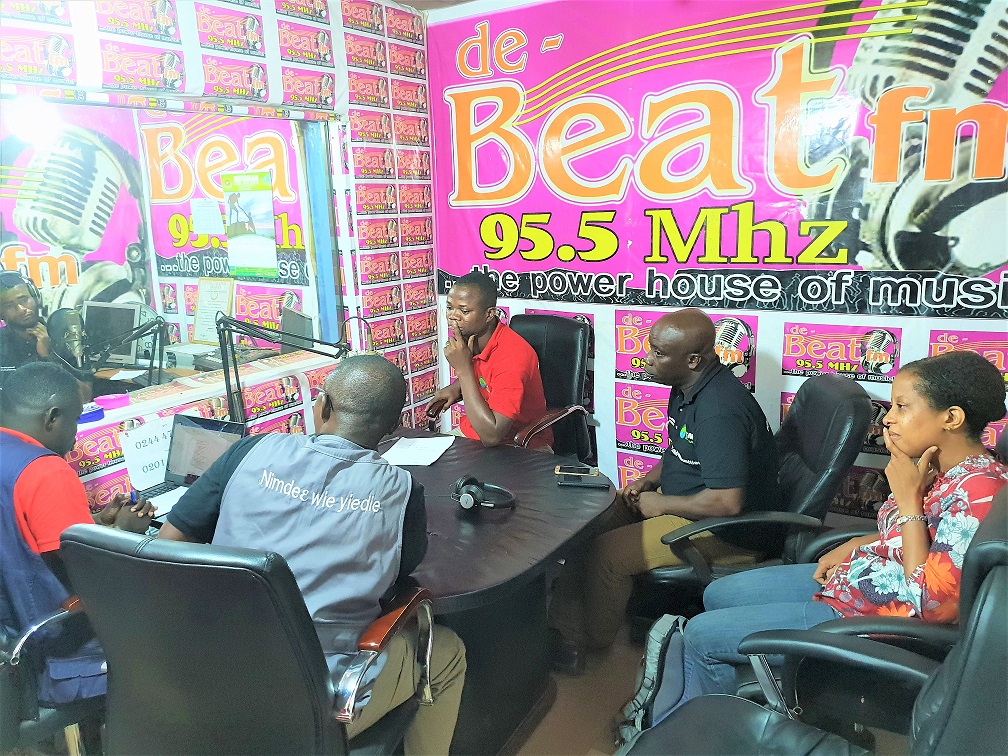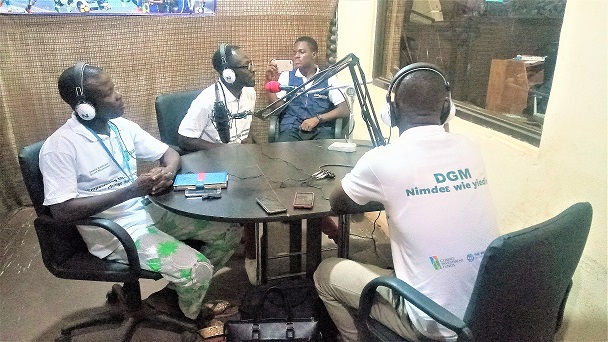
Supporting unique solutions that fit the local situation is a key component of Solidaridad programmes. Radio is the most available and accessible means of broadcast communication in DGM communities. Various low-cost devices, including mobile phones used in the local communities, have built-in radio receivers that make it handy for accessing radio content. In addition, most community members are farmers and radio devices help them to stay updated about current events even while working.
Today, we are witnessing massive community interest in climate change discussions in the region, as listeners recognize that their livelihood depends on the knowledge gained from the broadcast. – Samuel Addae-Boadu, DGM Project Coordinator for the Western Region.
Combining education with entertainment
The radio show features a panel discussion and a five-episode drama series prepared in Twi, a vernacular used by many in the targeted communities. A key segment of the broadcast is a phone-in session, which allows listeners to interact on the issues being discussed and share lessons and experiences.
Topics often addressed on the show include:
- How climate change manifests in local communities
- The impact of climate change on local communities
- The relationship between land use, climate change and local livelihood
- Frequently asked questions about the Ghana DGM project
- Climate-smart agriculture
- Good Agricultural Practices
- Cocoa agroforestry practices and challenges
- Tree tenure and benefit sharing arrangements
- Forestry policies (focus on off-reserve)
- Role of community members in fire prevention & control
The weekly show is led by a professional radio show host. Trained Solidaridad field officers are invited as expert guests to lead discussions on relevant topics. Solidaridad complements the panel discussions and audience phone-in sessions with customized radio jingles about climate change as well as “Live Presenter Mentions” and radio drama episodes.
A quiz competition that tests the knowledge and insight gained from the discussions is a popular segment of the radio show. Winners of the competition have included persons living in DGM communities and beyond.
“I had planned to remove five trees from my farm, but after listening to the Ghana-DGM radio broadcast, I have resolved to preserve them,” said Opanin Ntiamoah, who phoned in from Nchiraa, a non-DGM project community.

Reaching the community at large
Solidaridad procures airtime on local radio stations that operate within the catchment of the targeted local communities. Broadcasting is done during times convenient to the target audiences. Currently, the programme has been hosted by 10 different local radio stations that serve the 52 communities targeted by the DGM project. Participating radio stations include Adars FM, Trickie FM, Dormaa FM, Shalom FM, Star FM, Sene FM, Winners FM, among others.
Since ground implementation began in March 2018, the project has used radio as a means to complement other dissemination efforts to reach everyone in project communities, including the marginalized women, youth and migrants. – Bossman Owusu, Knowledge Management Specialist at Solidaridad West Africa.
The power of using local media to raise awareness has proven to be a persuasive component of the DGM project. Given the exciting responses from local communities beyond the project target areas, Solidaridad has sought to reach even more communities within the landscape through syndicated broadcasting. This allows for broadcasting directly from one source but connecting other radio stations within the area at the same time to leverage their reach, scope and unique audiences.
Learn more about Solidaridad programmes in West Africa
